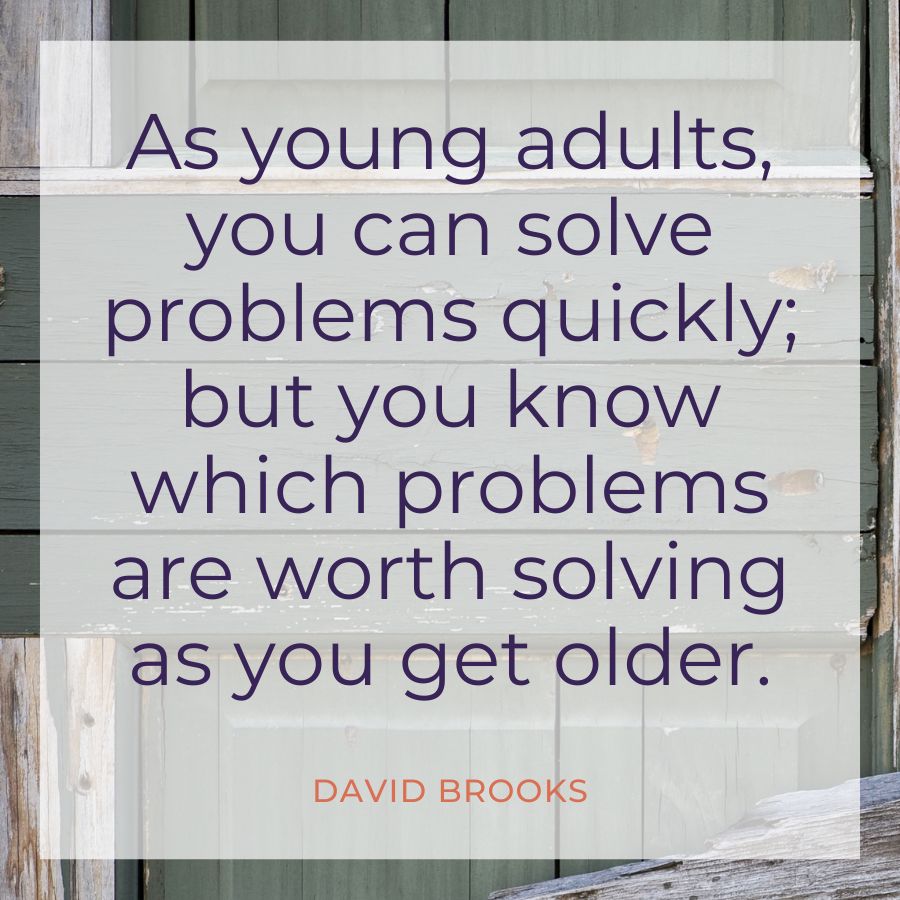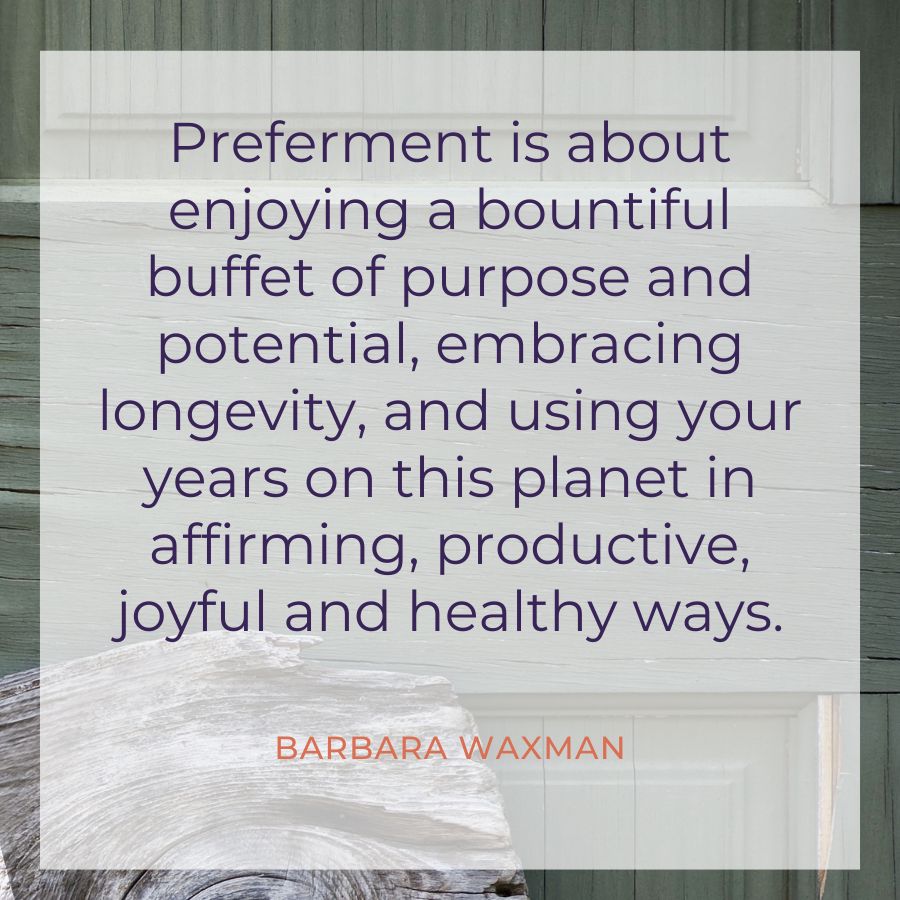There is a growing call and need in many countries–addressed in the US by projects like the New Map of Life and Modern Elder Academy–for a shift from an old school mindset where life happens in three primary chapters: learn, earn, and retire, to an upgraded attitude that is multi-dimensional and aspirational. Take a moment to consider the most common fears about retirement: could these be holding you back from a life of Preferment?
The Century-Long Lifespan is Here.
It's Time to Retire Retirement.
“Would you like to live to be 100?” is no longer just a fun quandary to talk about with friends. Instead, the century-long lifespan is becoming a reality–and with it comes both a question and an opportunity: what could we do, and who could we become with even more time?
Ken Dychtwald, CEO of Agewave, predicts boomers will have nearly four trillion hours of leisure time to fill within the next 20 years—in the US alone. Instead of dissociating in front of what my parents called the ‘boob tube,’ what if we could use this extra time to live the life we’ve always wanted to? What if some of these hours could be used to make the world a better place?
Your Ideas About Retirement Are Limiting You
The word retire is passive; it means to withdraw, to enter seclusion–-the language is limiting, imbued with connotations of decline and boredom. The truth is: with longer lives and better health, we have more years of living, not dying. Retirement was invented for an era that no longer exists–one with shorter life expectancies (58 for men and 62 for women), with roots going back to 1889 in Prussia when Otto von Bismarck created a pension system beginning at 65.
Today, the three-legged stool of social security, savings, and pensions has toppled. Saving for retirement is an individual responsibility, employer-defined pensions are rare, Social Security benefits are insufficient, and this is all made worse by Americans’ tendency to under-save. It comes as no surprise that a recent report found almost half of early retirees worry about outliving their money.
Your Identity is Too Closely Linked to External Ideas of Success
After decades of tying society’s definition of success to your identity, you may fear the cocktail party conundrum: thinking of yourself as a FIP (formerly important person) when people ask the very American question, “What do you do?”
Transitions, planned or not, are emotional landmines we struggle to predict and prepare for. As a result, many lose the sense of identity and purpose that felt so true. The reality is that those success stories have been most commonly bound up with extrinsic values that have us measuring with the wrong yardstick. Our idea of success doesn’t need to be so hard-fastened. What success looks like to you could and will shape-shift through every season of your life.
The most genuinely successful amongst us know that how you measure success is more of an internal yardstick (living aligned with your purpose) than an external one (a fancy job title, impressing people). What’s better? You have the freedom to design what that means to you. Is it starting a new purpose-driven business? Completing a yoga teacher training? Working for a company aligned with your purpose? Taking up creative pursuits? Nurturing your relationships? Volunteering your skills? Though our answers will all differ, our outcomes—experiencing more joy, connection and fulfillment—won’t.
You Live in Fear of Losing Health and Independence
Around the age people consider retirement, they typically feel physical and emotional changes, confusing transitions, and some aspects of decline, including cognition, power, identity, and more. Our bodies wear down, making the need for more, not less, time and effort to train to perform in ways we are used to. Cognitive decline–a top fear-does slows down in certain ways, though what is essential to know is that it is enhanced in others. Fluid intelligence—the ability to think quickly and recall information—is typically sharpest when younger. But crystallized intelligence—the accumulation of knowledge, facts, and skills acquired throughout life—improves with age. Some might even call it wisdom.
Let’s be clear: the very real physical and emotional changes, confusing transitions, and some aspects of decline associated with aging are hard. But on the flip side, opportunity lives in the shadows of change and challenge—advances in technology, medical care, wellness, and more, promise to make our coming decades energy-filled and exuberant–if we know how to optimize.

How to Live a Life of Preferment
Adopt The Language You Want to Reflect
Words are powerful. When we adopt language like “midlife crisis” and “senior moments,” we put ourselves in rhetorical shackles. My life’s mission is to change our discourse around aging, now referred to as its more aspirational companion, longevity. To do so, we must reframe and shift some language patterns. Whenever I describe my work as primarily being with “adults midlife and better,” the response is always positive. People giggle, thank me, and sometimes even take an unconscious breath of self-acceptance.
Breaking free of the language, myths, and mindsets that cause us to associate aging with demise primes our minds to anticipate the joys and possibilities—and sends open arms out to the challenges and twists of this stage of life. You may be familiar with Middlescence, the term popularized to debunk the midlife crisis myth. People often ask me whether I invented the word. I did not. In fact, it has been in usage, though not well defined, for a few decades now. Ken Dychtwald referred to Middlescence in two books, as did Gail Sheehy in her seminal work, Passages.
Now, let me introduce you to Preferment.
Instead of thinking, "Retire from..."
Preferment beckons us to "Aspire to..."
Create Your Preferment Portfolio™
Successfully transitioning from a stage where a career or caregiving is all-consuming takes a plan. Dychtwald suggests that the four (often fear-inducing) pillars of retirement planning are: finances, purpose, family, and health. I want to introduce you to a concept that addresses and can help resolve those fears: your Preferment Portfolio™.
The Preferment Portfolio™ isn’t just about financial wealth; it integrates the riches of relationships, self-care, purpose, hobbies, volunteering, travel and your relationship with time. Imagine the potential and possibilities in the metric of those four trillion free hours mentioned earlier. Preferment is living in alignment with your values. Imagine how some of those hours could make ourselves, our families, our companies, our communities and the world safer, saner and healthier!
What are you hungry for? What parts of your life must you align to feast on these next decades? Consider your answers, and apply them to your portfolio.
Close The Gap Between Healthspan and Lifespan

The question is not solely how we can live longer lives but how we can live longer, richer lives. Meaningful longevity is about matching the number of years you have (Lifespan) with living independently, with the ability to fully engage with the people and causes you care about in those years (Healthspan).
The goal is to be age agnostic, living by stage, not creating rules for yourself based on age, and integrating lifestyle medicine to cultivate your energy and equanimity. Another often overlooked facet of this is that improving healthspan isn’t just about eating well and keeping joints healthy–it’s about creating a life well-lived that’s at once stimulating and sustainable.
Learn, earn, retire no longer applies.
It's time to aspire to Preferment.
Half of today’s retirees (or, as I would call them, Preferees) say they are “reinventing themselves,” and more than 90% are looking forward to the years ahead.
Will you join them in finding more vigor and potential in this next season of life?
Help me spread the word.
Share this resource.